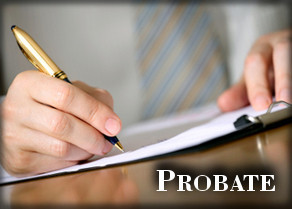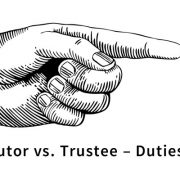How Do I Avoid Probate?
Successful Probate Avoidance Strategies
If saving time, money, and court supervision is right for your family, then avoiding probate is right for your estate plan. There is a common misconception that having a will avoids probate. This is completely false. Having a will does NOT avoid probate. There are however many simple ways to avoid probate and some strategies that even offer asset protection. But regardless of what estate planning method you choose, avoiding probate will avoid costly fees for your children and time consuming court proceedings. Here are a few helpful methods to consider.
Joint Ownership
Joint ownership is the most common method of probate avoidance and does not require the help of an attorney or other professional. Assets owned by more than one person result in the survivor taking ownership. Joint ownership examples might include a joint bank account or marital home. This is significantly beneficial when avoiding probate for a residence because the transfer of assets is immediate and does not require a court approved transfer. If you have a joint bank account, most banks require a simple death certificate and identification to transfer the account to the remaining account holder. In lieu of a trust, the downside of joint ownership is that it does not offer asset protection. Creditors may still attach their interest in a residence or asset of a jointly held account.
Beneficiary Designations
If you ever received life insurance or engaged with a financial planner, you’ve probably filled out a beneficiary designation. These are very common with retirement accounts (401(k), 403(b), IRA, etc), life insurance, annuities, and other assets. Here you simply designate the names of those you wish to receive the assets after your death. Beneficiary designations are a great way to avoid probate and keep your estate private. The transfer of assets is swift and does not require court approval. If you name your minor children as beneficiaries, it is recommended that you appoint a guardian because a minor cannot take control such an account. Once again however, the downside to beneficiary designations is that these assets are not protected against divorce, creditors, or litigation. For example, if your children inherit an IRA but then get divorced, the ex-spouse is will receive half of the retirement assets. (See trusts below for asset protection)
Transfer-on-Death
A transfer on death affidavit works just like a beneficiary designation. Here the “TOD” allows you to designate the person or entity to receive your assets upon your death. Just like a beneficiary designation, the TOD avoids probate while transferring assets swiftly and without court approval. This method saves time and cost for commonly titled assets like a home, automobile, boat, and more.
Payable on Death
Similar to Transfer on Death Accounts, POD’s also transfer assets seamlessly through naming a beneficiary. Here the difference is that POD’s usually refer to checking accounts, savings, and certificates of deposit while TOD’s refer to brokerage accounts, stocks, securities, and mutual funds. Both TOD’s and POD’s do not offer asset protection.
Trusts
The single best way to avoid probate while also providing asset protection is by creating a trust. A properly drafted trust is completely private, avoids probate, provides asset protection, and is advantageous for tax purposes (for larger estates). There are numerous trust planning strategies available for all different types of estates. For example, some trusts may be changed or modified during your lifetime (called revocable living trusts) or may not be changed (called irrevocable living trusts). Other trusts may pay taxes themselves while others allow the trust beneficiary to pay taxes. Regardless of what trust strategy is used, a properly drafted trust will ensure that your children and/or beneficiaries receive asset protection, favorable tax considerations, and probate avoidance.
To learn more about probate avoidance or trust planning strategies, contact an attorney at Baron Law LLC at 216-573-3723 or dan@baronlawcleveland.com Baron Law LLC is a Cleveland area law firm providing legal services in the areas of estate planning, probate, wills and trusts, Medicaid planning, and more.











